Customer Relationship Management (CRM) is crucial for every business. It involves the use of social platforms to manage the company’s interactions with its current and potential customers.
Social media is the perfect platform to engage with customers, improve branding, and generate sales. It offers you the opportunity to be a brand that delivers on the expectations of your customers.
Before we move on to discuss the benefits, elements, and strategies used in social CRM, let’s first take a look at how it is different from traditional CRM.
Traditional CRM vs Social CRM
Social CRM is different from traditional CRM, but how? Check out the table below to understand the differences between the two:
| Traditional CRM | Social CRM |
| Marketing is done via direct advertising aimed at boosting overall sales. | Marketing is done via conversations that add value to the life of the prospect. Conversations lead to engagement and engagement leads to sales. |
| It is a defined channel and any changes take longer to roll out. | It is not a defined channel and there is no waiting time to reach and respond to the customer. |
| Sales team keeps track of historical data and pushes the customer for repeat sales. | Sales team monitors social conversations or brand mentions and pulls the potential customer toward a sale in real-time. |
| Customer service is available during specific hours and days. | Customer service is available 24×7. |
| Company approaches the customer directly to obtain feedback via phone. | Customers share their feedback with the company online using different social channels. |
Top Benefits of Using a Social CRM
Gone are the days when creating a Facebook page and gathering over a thousand likes were enough for a business to sustain their social media presence.
Nowadays, businesses are spending more time interacting with their customers. They are gathering feedback to improve their products and responding to comments to keep their customers happy.
Your business needs a social CRM strategy in order to:
- Build a strong brand presence on social media.
- Hear the customer and respond to their comments when they need you the most.
- Monitor negative feedback and solve customer complaints as quickly as possible.
- Help their businesses enrich their social customer support.
- Offer a brand experience that is hard to ignore.
- Collaborate with influencers and increase brand trust.
- Identify the perfect social channels for your business.
- Boost your overall SEO.
- Build stronger and better relationships with customers.
Four Elements of Social CRM
Now that you understand the difference that social CRM can bring to your overall branding strategy, let’s discuss the four elements of social CRM:
1. Marketing
Social CRM marketing involves having a one-on-one dialog with your customers. You focus on building customer relationships.
You can use the help of influencers to reach more people who are genuinely interested in your products. But remember to choose influencers based on their engagement levels. Influencers with lots of followers do not necessarily generate a lot of engagement.
A study by Influence.co found that influencers with smaller followings have higher engagement rates.
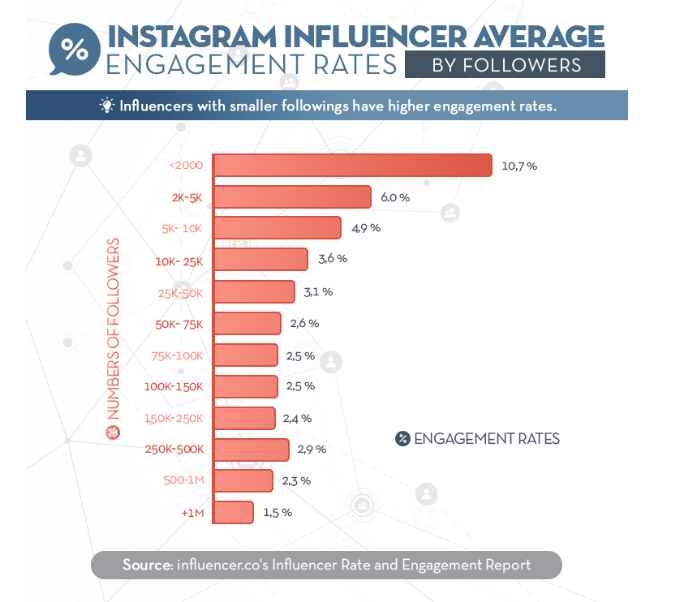
2. Sales
Social selling involves nurturing your leads instead of directly selling them products or services. Your sales team needs to be more social to shorten the sales cycle and increase productivity.
After identifying prospects, all your sales team needs to do is to nurture them so that they convert into customers.
You can create a content calendar to reach your prospects via their preferred channels at their preferred times. Interact regularly and optimize your communications based on the results.
Timing is crucial here and you must have a good understanding of the best times to post on social media. It’s all about helping your prospects and pulling them toward the bottom of the sales funnel.
3. Customer Support
Social CRM follows the best practices of using social media for customer support.
Track all of your brand mentions – both positive and negative – and respond to them as quickly as possible. Remember that 42% of consumers expect a reply from the company within the first 60 minutes.
There are times when your brand might not be mentioned directly. You need to track these indirect mentions and look for opportunities to help consumers. See how Best Buy does it in the below example:
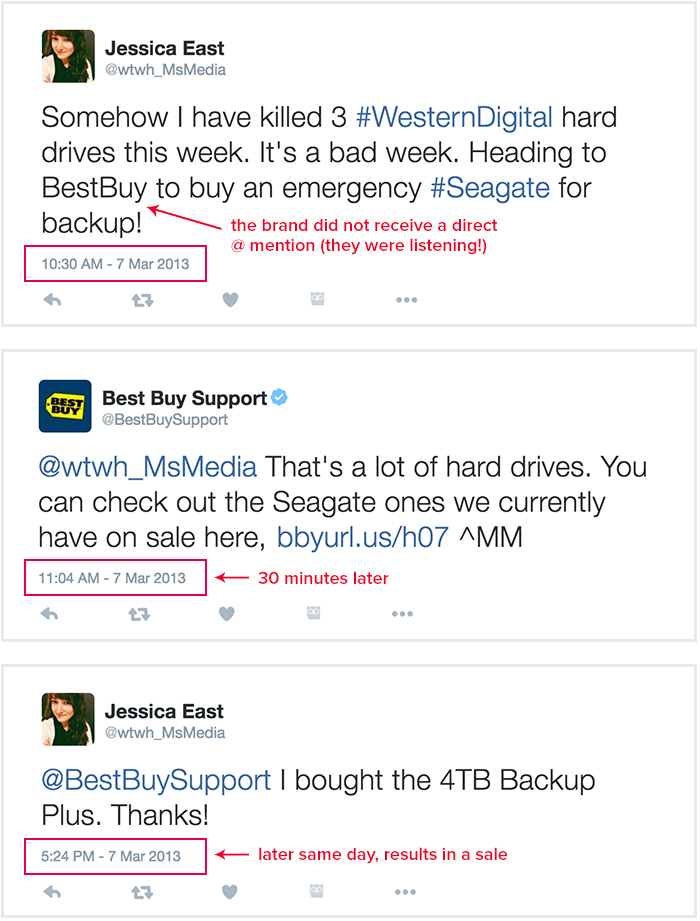
4. Feedback
Social CRM allows you to obtain customer feedback in real-time. For example, you can start receiving customer feedback as soon as your sale goes live.
Social mention tools also play a huge role in tracking customer emotions regarding a brand. You can use these tools to shortlist customer suggestions and improve your services or products.
Tips to Increase Brand Awareness via Social Media
1. Create Visual Content
Ideas and emotions are expressed visually in a much better manner. Social CRM provides your brand with an opportunity to share your messages visually with a large group of people.
The types of visual content that you can create on social media include:
- Photos
- Original graphics
- Videos
- Memes
- Quote cards
- Infographics
- Presentations
- Tutorials
- Gif-ographics
- Screenshots
- Flipbooks
Visual content is extremely helpful in branding your business because the human brain can process visuals 60,000 faster than text.
Grammarly, the automatic grammar checking tool, uses visual content brilliantly in their social media posts.
2. Use Different Tones for Different Platforms
Some people like Instagram while others are more comfortable using Facebook. There are different social platforms for different audiences depending on their passions.
When you are promoting your brand across an array of social channels, make sure to use different tones to fit the respective platforms.
Besides, your brand voice must match the tone of your message. It’s important because authentic communication differentiates the best brands from their competitors.
Prepare an audience persona and identify the tone they use on their social profiles. Try to match that tone. Your tone can be personal, humble, direct, scientific, clinical, or honest.
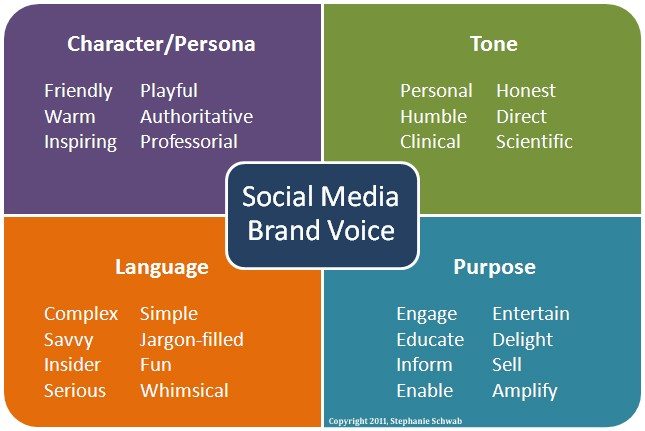
3. Leverage Influencer Marketing
Influencers can be extremely useful in generating publicity for your brand in a positive and authentic manner.
They help improve branding by expanding your business reach. Further, people trust influencer recommendations and this leads to increased sales.
Platforms like iFluenz can help you find the best matching influencers for your business. You can create your campaign brief for free and start receiving proposals from genuine influencers based on your set criteria like follower count and budget.
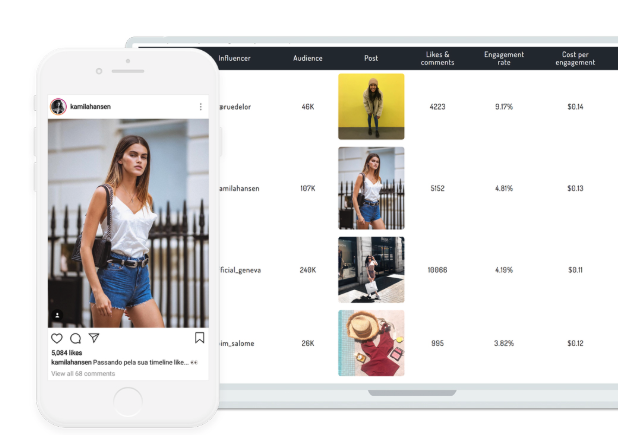
4. Listen to Your Customers and Respond Promptly
Social listening is a vital part of social CRM. It lets you track, analyze, and respond to customer comments. It also keeps you informed about what your audience thinks about your business.
How people feel about your brand should be positive or neutral but it should never go negative beyond a certain point. Measuring the overall sentiment of your social media audience is necessary to keep the negative score down.
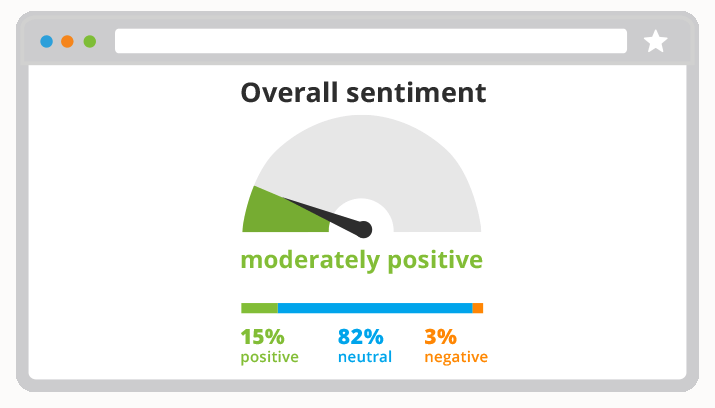
One way of doing that is by resolving the issue that your customers are facing as quickly as possible. When you make people happy, they spread a positive sentiment about your business which is crucial to keep your business successful.
Please note: Social listening is not just about listening to your own brand mentions. It also involves listening to your competitors or any other keywords that are relevant to your niche.
5. Use Social CRM Metrics to Measure Brand Awareness
Measuring brand awareness is essential in order to identify what works for your campaign.
You can use the following social CRM metrics to measure brand awareness:
- Likes
- Clicks
- Followers
- Mentions
- Comments
- Web traffic
- Trending hashtags
- Average engagement rate
Keeping track of the above metrics will help make sure that every dollar you spend goes into effective brand promotion.
Final Thoughts
Social media has become one of the major platforms for customer support. Social CRM is the integration of social media and customer relationship management. It involves communication, strategy, customer value, and relationship building.
We are living in the age of the social customer and you can’t ignore the power that rests in the hands of your customers. Adopting a social CRM strategy for your business can help to improve your branding as well as sales.


